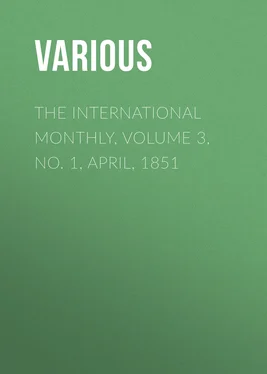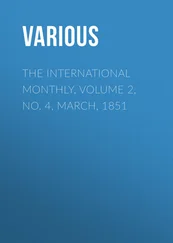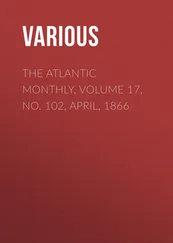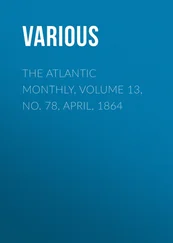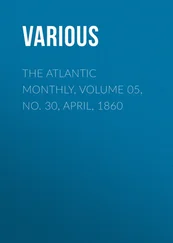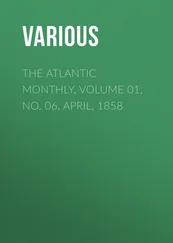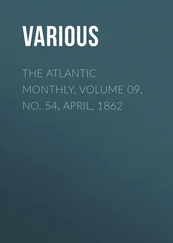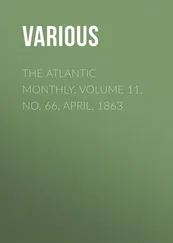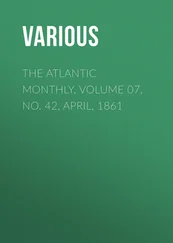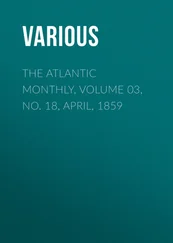Various - The International Monthly, Volume 3, No. 1, April, 1851
Здесь есть возможность читать онлайн «Various - The International Monthly, Volume 3, No. 1, April, 1851» — ознакомительный отрывок электронной книги совершенно бесплатно, а после прочтения отрывка купить полную версию. В некоторых случаях можно слушать аудио, скачать через торрент в формате fb2 и присутствует краткое содержание. Жанр: foreign_antique, periodic, foreign_edu, на английском языке. Описание произведения, (предисловие) а так же отзывы посетителей доступны на портале библиотеки ЛибКат.
- Название:The International Monthly, Volume 3, No. 1, April, 1851
- Автор:
- Жанр:
- Год:неизвестен
- ISBN:нет данных
- Рейтинг книги:3 / 5. Голосов: 1
-
Избранное:Добавить в избранное
- Отзывы:
-
Ваша оценка:
- 60
- 1
- 2
- 3
- 4
- 5
The International Monthly, Volume 3, No. 1, April, 1851: краткое содержание, описание и аннотация
Предлагаем к чтению аннотацию, описание, краткое содержание или предисловие (зависит от того, что написал сам автор книги «The International Monthly, Volume 3, No. 1, April, 1851»). Если вы не нашли необходимую информацию о книге — напишите в комментариях, мы постараемся отыскать её.
The International Monthly, Volume 3, No. 1, April, 1851 — читать онлайн ознакомительный отрывок
Ниже представлен текст книги, разбитый по страницам. Система сохранения места последней прочитанной страницы, позволяет с удобством читать онлайн бесплатно книгу «The International Monthly, Volume 3, No. 1, April, 1851», без необходимости каждый раз заново искать на чём Вы остановились. Поставьте закладку, и сможете в любой момент перейти на страницу, на которой закончили чтение.
Интервал:
Закладка:
"I opened mine in terror. The idea so possessed my mind, that a thrill of fear ran through me, and I wished to exchange the ghastly image of my fancy for the realities around. I see them still; the very room, the dark parquet , the closed shutters, with the moonlight struggling through, and the sense I had that the glassy lake and white high Alps were beyond. I could not so easily get rid of my hideous phantom; still it haunted me. I must try to think of something else. I recurred to my ghost story,—my tiresome unlucky ghost story! O! if I could only contrive one which would frighten my reader as I myself had been frightened that night! Swift as light and as cheering was the idea that broke in upon me. 'I found it! What terrified me will terrify others; and I need only describe the spectre which had haunted my midnight pillow.' On the morrow I announced that I had thought of a story . I began that day with the words, It was on a dreary night of November , making only a transcript of the grim terrors of my waking dream."
The next year Shelley and herself were in Buckinghamshire, where the great poet wrote The Revolt of Islam . In the spring of 1818, they quitted England for Italy, and their eldest child died in Rome. Soon after, they took a house near Leghorn—half way between the city and Monte Nero, where they remained during the summer.
"Our villa," she says, "was situated in the midst of a podere; the peasants sang as they worked beneath our windows, during the heats of a very hot season, and at night the water-wheel creaked as the process of irrigation went on, and the fire-flies flashed from among the myrtle hedges:—nature was bright, sunshiny, and cheerful, or diversified by storms of a majestic terror, such as we had never before witnessed."
The Cenci and several other poems were written here. The summer of 1818 they passed at the Baths of Lucca, and in the autumn went to a villa belonging to Lord Byron, near Venice, whence they proceeded to Naples, where the winter was spent; after which they visited Florence, and in the fall of 1820 took up their residence at Pisa. The next year—in July—Shelley's death occurred: he was drowned in the gulf of Lerici. The details must be familiar to all readers of literary history. Mrs. Shelley wrote of the time:
"This morn thy gallant bark
Sailed on a sunny sea,
'Tis noon, and tempests dark
Have wrecked it on the lee,
Ah woe! Ah woe!
By spirits of the deep
Thou'rt cradled on the billow,
To thy eternal sleep.
Thou sleep'st upon the shore
Beside the knelling surge,
And sea-nymphs evermore
Shall sadly chant thy dirge.
They come! they come,
The spirits of the deep,
While near thy sea-weed pillow
My lonely watch I keep.
From far across the sea
I hear a loud lament,
By echo's voice for thee,
From ocean's caverns sent.
O list! O list,
The spirits of the deep;
They raise a wail of sorrow,
While I for ever weep."
Mrs. Shelley returned to England, and for nearly twenty years supported herself by writing. In the last ten years—more especially since 1844, when her son succeeded to the Shelley estates—she had no need to write for money, and it is understood that she devoted the time to the composition of Memoirs of Shelley .
The Frankenstein , or Modern Prometheus , of Mrs. Shelley,—a fearful and fantastic dream of genius—was never very much read; it was one of those books made to be talked of; her Lodore was more easily apprehended; it is a love story, from every-day life, but written with remarkable boldness and directness, and a real appreciation of the nature of both woman and man. The hero of this novel is the son of a gentleman ennobled for his services in the American war, and some of the scenes are in New-York. The Last Man has for its hero her husband, whose character is delineated in it with singular delicacy, but the book is in the last degree improbable and gloomy, while abounding in scenes of beauty and intense interest. She wrote also Perkin Warbeck , Falkner , Walpurga , and other novels, Journal in Italy and Germany , and Lives of eminent French Writers , besides editing the Poems and the Letters of Shelley—a labor which she performed judiciously, and with feeling and accuracy.
Mrs. Shelley's son succeeded to his grandfather's baronetcy on the 24th of April, 1844, and is the present Sir Percy Florence Shelley, Bart., of Castle Goring, in Sussex.
REV. H. N. HUDSON'S EDITION OF SHAKSPEARE
It has been known among his friends for several years that the Rev. Henry N. Hudson was preparing for the press an edition of the works of Shakspeare. The office of a Shakspeare restorer and commentator at this time is one of the most ambitious in the republic of letters. More than any collection of works except the Holy Scriptures—to which only they are second in dignity and importance among books—the Works of Shakspeare demand for their fit illustration not only the most varied and profound scholarship but the most eminent qualities of mind and feeling. Mr. Hudson had vindicated his capacities for the noble service upon which he has entered in his Lectures upon Shakspeare, published about three years ago. The fame he then acquired will be increased by his present performance, of which, we understand, the initial volume will in a few days be published by James Munroe & Co., of Boston, who will issue at short intervals the other ten, the last of which will embrace a Life of the Poet by the editor. Some of the main characteristics of this edition may be inferred from these paragraphs, which we are enabled to make from an early copy of the preface.
"The celebrated Chiswick edition, of which this is meant to be as near an imitation as the present state of Shaksperian literature renders desirable, was published in 1826, and has for some time been out of print. In size of volume, in type, style of execution, and adaptedness to the wants of both the scholar and the general reader, it presented a combination of advantages possessed by no other edition at the time of its appearance. The text, however, abounds in corruptions introduced by preceding editors under the name of corrections. Of the number and nature of these corruptions no adequate idea can be formed but by a close comparison, line by line, and word by word, with the original editions.
"The Chiswick edition, though perhaps the most popular that has yet been issued, has never, strange to say, been reprinted in this country. For putting forth an American edition retaining the advantages of that, without its defects, no apology, it is presumed, will be thought needful. How far those advantages are retained in the present edition, will appear upon a very slight comparison: how far those defects have been removed, we may be allowed to say that no little study and examination will be required to the forming of a right judgment. In all of the plays, the chief, and in many of them the only, basis and standard whereby to ascertain the true text, is the folio of 1623. In our preparing of copy we have this continually open before us, at the same time availing ourselves of whatsoever aid is to be drawn from earlier impressions, in case of such plays as were published during the author's life. So that, if a thorough revisal of every line, every word, every letter, and every point, with a continual reference to the original copies, be a reasonable ground of confidence, then we can confidently assure the reader that he will here find the genuine text of Shakspeare.
"The process of purification has been rendered much more laborious, and therefore much more necessary, by the mode in which it was for a long time customary to edit the poet's works. This mode is well exemplified in the case of Malone and Steevens, who, carrying on their editorial labors simultaneously, seem to have vied with each other which should most enrich his edition with textual emendations. Both of them had been very good editors, but for the unwarrantable liberty which they not only took, but gloried in taking, with the text of their author; and, even as it was, they undoubtedly rendered much valuable service. And the same work, though not always in so great a degree, has been carried on by many others: sometimes the alleged corrections of several editors have been brought together, that the various advantages of them all might be combined and presented in one. Thus corruptions of the text have accumulated, each successive editor adding his own to those of his predecessors. Many of these so-called improvements were thrown out by the editor of the Chiswick edition; but no decisive steps in the way of a return to the original text were taken till within a very limited period. Knight, Collier, Verplanck, and Halliwell, to all of whom this edition is under great obligations, have pretty effectually put a stop to the old mode of Shaksperian editing; nor is there much reason to apprehend that any one will at present venture upon a revival of it.
Читать дальшеИнтервал:
Закладка:
Похожие книги на «The International Monthly, Volume 3, No. 1, April, 1851»
Представляем Вашему вниманию похожие книги на «The International Monthly, Volume 3, No. 1, April, 1851» списком для выбора. Мы отобрали схожую по названию и смыслу литературу в надежде предоставить читателям больше вариантов отыскать новые, интересные, ещё непрочитанные произведения.
Обсуждение, отзывы о книге «The International Monthly, Volume 3, No. 1, April, 1851» и просто собственные мнения читателей. Оставьте ваши комментарии, напишите, что Вы думаете о произведении, его смысле или главных героях. Укажите что конкретно понравилось, а что нет, и почему Вы так считаете.
